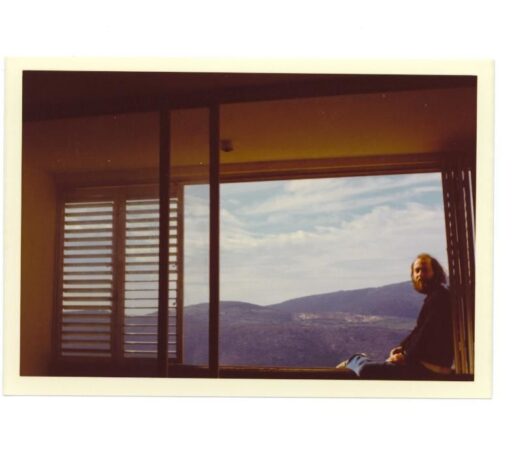Two weeks after the dramatic July 4, 1976, rescue of hostages—Israeli as well as non-Israeli Jews—from Entebbe International Airport, I learned my first word of modern Hebrew: savlanut. Along with seventy other volunteers, I was in a chapel across from the JFK terminal where our El Al flight would depart for Israel in a few hours. Savlanut, that’s the most important word, said Nurit, the director of Sherut La’am, told us.
Nurit didn’t mention Operation Entebbe. An Air France flight from Tel Aviv to Paris was hijacked, after a layover in Athens, and flown to Uganda. Of the 248 passengers, 148 non-Jews were released and flown to Paris. The Jews were held until their rescue by the Israeli military.
Entering the chapel, I picked up a cheap yarmulke from a box at the entrance. I hadn’t worn a yarmulke since my bar mitzvah nine years earlier. Most of the other members of our cohort had been to Israel before. I hadn’t. On Friday nights, my family didn’t talk about Israel or anything Jewish while we enjoyed cheesesteaks and pepperoni pizza.
After three months of ulpan in an absorption center in Kiryat Shemona, we’d be sent to the arayat petuach where we’d serve as volunteers—including as teachers and community center staff—for the remaining nine months of the program.
Savlanut, Sherut La’am, yarmulke, ulpan, arayat petuach: these words are as natural to me now as “patience,” “service to the people,” “head covering,” “Hebrew language immersion school,” “development towns.”
If you are teaching English, Nurit said, the kids may try to throw chairs out the window. Nurit was trying to warn us, even to scare us. Development towns, where we’d be working, had evolved from tent encampments that absorbed hundreds of thousands Jewish refugees fleeing Arab countries in the 1950s. If you don’t think you can make it for the full year, please turn back now. We’ll refund the cost of your airfare.
*
Fifty-one weeks later, I sat on a hill overlooking Tzfat’s famous cemetery. Shlomo Alkabetz, author of the mystical Kabbalat Shabbat hymn Lekha Dodi, “Come, My Bride,” sung in synagogues around the world to welcome the Sabbath, is buried there. Yosef Caro, who wrote the Shulkhan Arukh (an organized compilation of Jewish law) assisted—according to legend, by an angel—is buried there. Isaac Luria, one of the most famous and influential Kabbalists, is buried there.
On one of my first Shabbats in Tzfat, where I was placed as a Sherut La’am volunteer, I wandered through the cemetery. I sat on Luria’s crypt. The spirit of Luria entered my body and dictated a poem to me. Months later, when that poem, “At Luria’s Grave,” was accepted for publication—my first published poem!—my roommate, who would go on to become one of the United States’ leading Jewish Renewal rabbis, said, of course that poem was accepted for publication. You didn’t write it!
On the eve of my return to Cherry Hill, New Jersey, I was hosting a shaliach (Israeli emissary) who, as part of his training, was visiting volunteers in programs sponsored by the Sachnut, the Jewish Agency. Soon, he would be sent to a Jewish community abroad to represent Israel. Having immigrated with his family to Jerusalem a number of years before we met, he turned to me and said, You don’t seem ready to leave. Until that moment, I hadn’t considered extending my stay. He worked in theater, as, if I’m remembering right, a director. He knew I was a young poet. He could introduce me to other poets and writers in Jerusalem. Come stay with my family for a few days. See if you like it. Look for a job. A few days later, I was offered a job working with Jewish youth group leaders from around the world in an educational media center.
*
I don’t know what drew me to Israel. Nor do I remember how I befriended another American Jew who invited me to run a series of poetry readings at Moadon Tzavta. Moadon Tzavta was a culture club on King George Street in Jerusalem, owned, at that time, by Israel’s Labor Party.
Yehuda Amichai and Anton Shammas opened the series. Amichai lived in West Jerusalem, Shammas in East Jerusalem. They each read their own work in the original languages, Hebrew and Arabic, and they each read poems by the other that they had translated, Shammas’s into Hebrew, Amichai’s into Arabic. I knew a little about East Jerusalem, a little about the West Bank. With some of the youth group leaders, I had visited Ramallah and Jericho to interview Palestinians, to photograph and record them. Before going to Israel, I had had a minimal Jewish education. In Israel, I was at once in kindergarten, college, and graduate school in Jewish studies. That night as Amichai and Shammas read, I understood, by the size and response of the audience, that something powerful was happening.
For what felt like the first time in my life, I became part of a story that had a long, complex history. In Jerusalem, my heart was whole.
*
In Jerusalem, my home, I kissed a Wall. On a beach in Tel Aviv, I kissed a Jewish girl from Belgium. While I was busy with that kiss, my small backpack, with my Pentax camera, my copy of Naked Poetry, and my American passport was stolen. My Israeli ID card—I had become a temporary resident—was safe in my apartment in Jerusalem.
*
A few months into my third year in Israel, I booked a flight home for a few weeks. As the plane took off from Ben Gurion Airport, a voice told me to look long and hard out the window. You won’t be back for a long time, the voice said. That’s crazy, the voice of reason within me responded. You have a job, an apartment, many friends to return to.
I didn’t return. Not to live.
*
If you were to visit me at my house now, on the wall facing the front door you’d find a signed broadside of “Twigs,” a poem by the late, great Palestinian poet Taha Muhammad Ali. Taha fled his home in Saffuriyya, a village in the Galilee, in 1948 when it came under attack during Israel’s War of Independence. After a year in Lebanon, he returned, settling in nearby Nazareth where he owned a souvenir shop close to the Church of Annunciation. I brought Taha together with the Israeli poet Aharon Shabtai and their translator, Peter Cole, to Asheville to read in Fall 2002.
The penultimate “twig” of the poem:
And so it has taken me all of sixty years to understand that water is the finest drink, and bread the most delicious food, and that art is worthless unless it plants a measure of splendor in people’s hearts.
*
Have you been waiting for me to say something about the current war? Are you expecting me to take sides?
I call heaven and earth to witness against you this day: I have put before you life and death, blessing and curse. Choose life… (Deut 30:19).
I choose life.
*
The final “twig”:
After we die and the weary heart has lowered its final eyelid on all that we’ve done, and on all that we’ve longed for, on all that we’ve dreamt of, all we’ve desired or felt, hate will be the first thing to putrefy within us.
*
The only whole heart is a broken heart, said Rabbi Menachem Mendel of Kotzk.
Today my heart is broken.
Though my address has been an American address for the last forty-four years, I never left Israel.
Richard Chess has published four books of poetry, the most recent of which is Love Nailed to the Doorpost. Professor emeritus from UNC Asheville, where he directed the Center for Jewish Studies for 30 years, Chess serves on the boards of Yetzirah: A Hearth for Jewish Poetry and Black Mountain College Museum + Arts Center, where he co-directs its Faith in Arts project. You can find him at www.richardchess.com .





